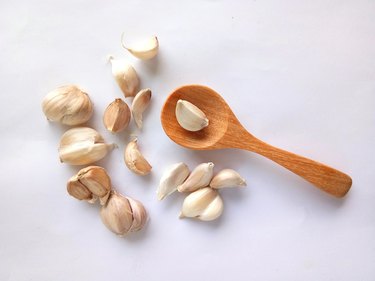
Are you craving mustard? Sweets? Garlic? Do you have a hankering for fast food or a sudden desire for salt? According to several scientific studies, there may be a good explanation for your food cravings.
Tip
You may have genetics, BMI and conditioning to thank for your food cravings.
Video of the Day
Reasons for Craving Garlic
Garlic, according to Better Health Channel, is a staple of European and Asian cuisine and has been around for thousands of years. Ancient Egyptians used it as food and medicine, while Ancient Greeks used it to treat digestion problems and respiratory infections.
Video of the Day
Aside from making your dishes tastier, it touts a number of benefits. For starters, it's an excellent source of vitamin C, B6, selenium, manganese and zinc — which helps support immune system functioning. It also helps supply energy — 100 grams of garlic supplies 500 kilojoules — and contains potentially disease-preventing sulfur properties.
You may find yourself craving garlic from time to time. Like sweets, carbohydrates, fast-food fats, salt and other types of food, garlic can evoke cravings. A food hankering occurs for a number of reasons, among them your BMI, the type of food, nutrient intake, genetics and frequency of consuming the food for which you have the craving.
Read more: Which is Healthier? Raw or Cooked Garlic?
Food Cravings, Conditioning and Genetics
An August 2017 study in Obesity (Silver Spring), found that the frequency of consuming certain foods can predict cravings for those foods during weight loss. In other words, the less frequently you consume a food, the less likely you'll crave it.
Food cravings abate during periods of food restriction. For example, restricting your carbohydrate intake will presumably decrease your carbohydrate cravings. The same goes for garlic, the less you consume it, the less likely you'll crave it.
In a January 2011 study in Nutrition Reviews, food cravings were linked to genetics. Many elements affected by genetics, such as BMI, metabolism, hormones and the brain's reward center, play a role in food cravings.
The study identified genes that can influence a predilection for the five different taste profiles: sweet, bitter, salty, sour and umami. Those who possessed an enhanced perception of bitter tastes, for instance, tended to avoid certain foods, such as particular types of fruits and vegetables.
Read more: 4 Foolproof Ways to Outsmart Your Cravings Forever
Food Cravings: BMI and Nutrients
In one August 2014 study in Eating Behaviors, researchers observed that there was a positive relationship between body mass index (BMI) and food cravings: the higher your BMI, the higher your likelihood of developing cravings. Individuals with obesity were found to be more likely to have food cravings.
While cravings were particularly significant for certain types of foods, such as carbohydrates and starches, sweets and fast-food fats, there was no connection between BMI and food cravings for particular types of foods. Whether you have a craving for coke in particular, for example, wouldn't be associated with your BMI.
If cravings increase with body weight, how do they correlate with nutrient intake? A small May 2016 study of 26 female participants in Semantic Scholar by researchers at Texas Christian University, found that correlation of cravings with micro and macro nutrient intake was variable.
For example, the only micronutrient associated with cravings was zinc. Participants who had higher zinc intakes, were more likely to crave fried food, while, the only macronutrients linked to food cravings were carbohydrates. Those who consumed more carbohydrates, craved meat more often.
- Better Health Channel: "Garlic"
- Obsesity (Silver Spring): "Frequency of Consuming Foods Predicts Changes in Cravings For Those Foods During Weight Loss: The POUNDS Lost Study"
- Eating Behaviors: "Food Cravings, Food Intake, and Weight Status In a Community-Based Sample"
- Nutrition Review: Genetics of Eating Behavior: "Established and Emerging Concepts"
- Semantic Scholar: "The Correlation Between Cravings and Reported Nutrient Intake in Female University Students Ages 18-24"